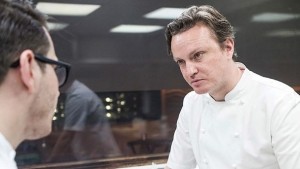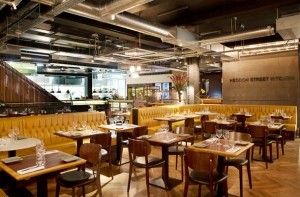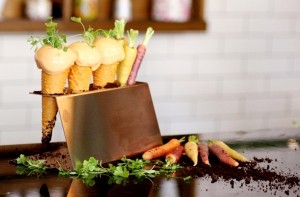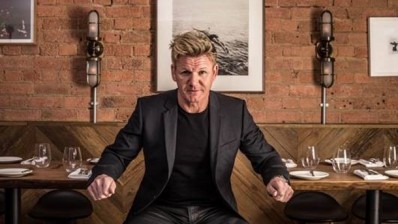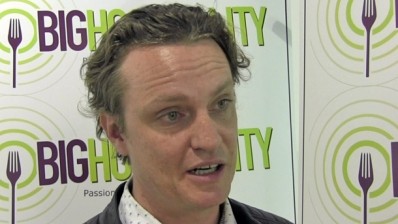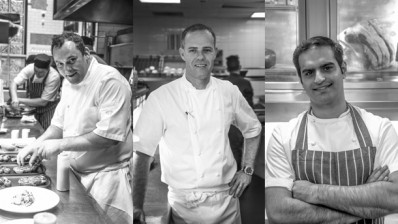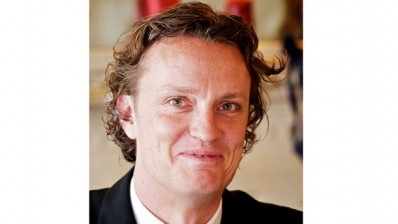James 'Jocky' Petrie on joining Gordon Ramsay Group

James Petrie says his new role as group executive development chef at Gordon Ramsay’s restaurant group is all about asking questions, and in this regard he’s certainly fulfilling his brief. They come quick fire.
“Are you ready to go? Has this dish changed? How was your holiday? Are you happy to be back? Are you happy with this plate? Is it on the menu now?
We’re in the kitchen at Maze in Mayfair. Petrie – or Jocky as he is more commonly known – and Maze head chef Alex Thiebaut are prodding at a dish of soy-glazed smoked eel with thinly sliced preserved lemons, balls of apple and cauliflower prepared in various ways.
Jocky has a remarkable ability to put people at ease. He doesn’t get many answers to his opening salvo of questions but they inject levity into what could have easily been an awkward conversation about a dish that needs a fair bit of tweaking.
“The first thing I’d say is that the raw cauliflower isn’t right,” he says, gesturing to some neatly cut, but rather thick slices of the brassica. “The flavour of the eel is a little muddy too, have you changed something? I’d like to see what it’s like with nice strips of apple rather than balls. We could get some dried cauliflower on the plate for a bit of crunch and I’d also like to try using the leaves and the root. Perhaps we could do a carpaccio with the stalk?”
He scoops up a little of the brilliant white cauliflower purée over which the rest of the dish has been artfully arranged. “Aren’t we putting in raw cauliflower juice to freshen it? The juicer broke did it? Was it one of Heston’s?"
He howls with laughter. Then, seeing the steady red light of the dictaphone, attempts to manually redact this gag about his former employer’s range of home-cooking equipment by emitting a loud buzzing sound. This is followed by another round of laughter.
A Fresh perspective
This gregarious Scot was employed by Ramsay and Gordon Ramsay Group (GRG) managing director Stuart Gillies earlier this year to bring a fresh perspective and rigour to the development process across the group’s 14 London restaurants. With an estate comprising everything from top-end one-offs such as the Savoy Grill and the Michelin-starred Petrus through to more casual venues, it’s a job spec that is as challenging as it is varied.
The 37-year-old is a well-known figure in the upper echelons of the cheffing world, having been one of Heston Blumenthal’s key lieutenants at The Fat Duck Group for more than a decade. He’s quick to make it clear that he won’t be bringing the culinary pyrotechnics he was associated with at the three Michelin-starred Bray establishment to Ramsay’s restaurants. “It’s not going to be whacky. But, of course, I’ll be introducing things that I learnt and developed at The Fat Duck,” says the chef, who has a specialism in pastry, but has always kept one foot in the hot kitchen to avoid becoming typecast and forever consigned to the world of desserts, pastries and breads.
His degree of involvement will differ depending on the restaurant. He won’t be looking over Clare Smyth’s shoulder at Restaurant Gordon Ramsay, the group’s three-Michelin star Chelsea flagship, for example. “I’m not going to be checking her dishes. I wouldn’t dare,” he says. “Hospital Road is an institution. It doesn’t require much involvement from me. But I see Clare a lot and we’re always talking about food and, if anything comes up that she needs help with, I’ll be there.”
But at the two restaurants he’s visiting today – Maze and later down the road at Heddon Street Kitchen – he’s assessing the execution of the cooking as well as the development process.
“I always start by asking the chef what they think could be better. It’s a type of reverse psychology. Nine times out of 10 they know what the problem is and how to deal with it. Nobody has done anything wrong. I’m simply here to look at things from a different perspective,” he explains. “It’s my job to question everything. Is that really the best we can do? Sometimes the answer is yes, and sometimes the answer is no.”
More than just development
Jocky is well-equipped for a transition to a more corporate environment. He’s organised, understands the importance of process and is used to being pulled in lots of different directions. His role at The Fat Duck – or as he refers to it ‘the Duck’ – saw him work across dozens of concurrent projects, from dealing with food manufacturers to create supermarket ready meals and helping to rewrite the menu at Little Chef to designing dishes for a restaurant with three Michelin stars.
Every other week, he visits two GRG restaurants a day for a tasting, one in the morning and one in the afternoon. Each head chef cooks about six dishes for him. Some will be evolutions of what Jocky has tried before, others will be brand new. He has set up a collaborative workflow that allows him and the rest of the senior chef team to keep track of the development process via an app.
In many respects, his role is more comparable to that of an executive chef. In the overall hierarchy of the company, he sits below managing director Stuart Gillies, alongside F&B director Nicolas Grounin (his front-of-house counterpart) and above the two executive chefs that oversee the Maze brand and Ramsay’s more casual Street Kitchen restaurants. His remit includes everything from kitchen design and
food waste management to chef recruitment and retention.
Initially, Jocky was only going to work within GRG’s UK business, but his role was recently expanded to include some of the group’s international restaurants. Last month, he travelled to France with Smyth to do supplier research for the group’s upcoming restaurants at the Grand Hôtel de Bordeaux.
He is also involved in Bread Street Kitchen Dubai, which opens next month. The 480-cover restaurant is home to an exclusive ice cream concept designed by him where gelato is formed around a stick that is then dipped into a selection of toppings and sauces.
Picking out winners
A lot of Jocky’s work looks set to be identifying successes in one part of the business and working out how to replicate them elsewhere. The burger is an especially important product category for the group – Ramsay’s burgeoning US operation shifts thousands a week across the Burger and Pub & Grill brands – so one of his first tasks was to assess the group’s patties.
We’re now sitting around a table at Heddon Street Kitchen assessing a near perfect burger. It’s something of a coup for the group seeing as Jocky has already done work within the category, having been involved with the In Search of Perfection episode that tackled hamburgers.
“This already has had a lot of effort put into it so I haven’t had to do much,” he says after neatly cutting it in half and carefully assessing the arrangement of the ingredients, a patty made with short rib, flank, chuck and some shredded beef fat, pickles, Monterey Jack cheese and smoky bacon mayonnaise. “The two things I’m working on now is how to work with Westminster City Council, which is quite picky about how burgers are cooked, and how to roll it out across the group, because every restaurant that serves a burger should be serving this one.”
Following his earlier visit to Maze, he’s also identified a dish he thinks could be a good fit for the group’s Plane Food restaurant at Heathrow Terminal 5, a classic udon noodle hot pot topped with tempura prawns.
“It’s a great dish. Very light, exactly the sort of thing you’d want to eat before getting on a plane. It’s also quick for the team to make. They do 1,200 covers a day so it needs to be,” he says.
Jocky’s only concern is that some customers might be put off by the tempura prawns that top it (the broth steams the batter and makes it a bit floppy). After talking through the options with Gohei Kishi, who oversees sushi and other specialist Japanese dishes for the Maze brand, a decision is made to try it instead with the grilled chicken that’s already to hand at Plane Food.
Jocky has already put one of Kishi’s creations on the menu at Heddon Street and its sister restaurant Bread Street Kitchen over in the City. It’s easy to see what attracted him to the Japanese-born chef’s take on a Californian roll: perfectly cooked rice studded with toasted sesame seeds wrapped around avocado and topped with king crab mayonnaise. It’s a stunner, but it seems improbable that it can be replicated by non-specialist chefs.
“It is a challenge,” Jocky admits. “Kishi came here and trained everyone. As a dish it’s actually quite well-suited to a high-volume operation because all the work is before service. It’s now a matter of doing regular spot checks to make sure the consistency is there.”
The group’s culinary output encompasses a number of cuisines Jocky has limited experience with, but he isn’t phased by this one bit. “We’re all still learning. It’s really exiting to be working with Kishi on Japanese food and also looking at produce-led Italian cooking at Union Street Café (a relatively new addition to the group’s portfolio in Southwark). The brilliant thing about naivety is that it often leads to creativity because you’re more likely to question things.”
Going back to the source
It’s early days, but Jocky has already identified some key areas for improvement as well as ideas that can be rolled out across the majority of the estate.
“I’m planning to bring in some interesting food pairings and change the way we make stock. The pressure cooker technique we worked on in Bray cuts down preparation time, is more consistent and results in a better end product. I’m also going to be doing some work on meat cookery at some of the more casual restaurants, most notably brining, sous vide and tweaking the way we use our grills,” he says.
But Jocky’s biggest focus at the moment is how the group uses its suppliers. After leaving The Fat Duck he spent a year working at Brett Graham’s two Michelin-starred London restaurant The Ledbury as head of development and has clearly been heavily influenced by the Australian chef’s approach to sourcing.
“We’re often too prescriptive. Why do we need all the carrots to be the same size? If it tastes amazing, let’s use it. That’s very much Brett’s attitude and he’s really leading the way on how this industry interacts with its suppliers. He’s willing to work with what he’s given so long as the quality is there,” he says.
Jocky’s time at The Fat Duck and The Ledbury has made him a walking directory of suppliers but even more intriguing are his connections that operate within the bleeding edge of food production and processing.
His research within The Fat Duck’s development kitchen has taken him all over the world on the hunt for specialist ingredients and food manufacturing processes. He talks at length about a Swiss-produced beef, which is inoculated prior to ageing to defend it from certain types of bacteria that create undesirable cheesy flavours; a UK-based producer that can produce thousands of different grades of malt (some are so dark they are comparable to balsamic vinegar in flavour); and a Belgium butcher that uses rib eye and sirloins to create extraordinary cured beef ‘hams’.
“I first tried the beef hams at Tickets (the Barcelona restaurant headed by Albert Adrià) when I was doing a stage there early this year. The guy uses a special enzyme to turn the fat into jelly. It’s just ncredible. It’s Spanish beef cured in Belgium – not good for air miles, but it’s good for taste. We’re going to be the first UK group to serve it,” says Jocky, who will continue to work with academics and food manufacturers to explore new techniques and ingredients.
Jocky’s understanding of the mechanics of cooking and dish development are second to none, but his relentlessly inquisitive nature is perhaps his biggest single professional asset.
Sometimes it’s difficult to keep up with his train of thought. A conversation about a project with The University of Northampton to use every single part of a cow including the hide segues into a potted history of Norwich’s tanning industry. Struggling to see what relevance this has to food and restaurants, I tentatively ask him what the culinary application of leather making is. He looks perplexed and a little put out.
“Well I don’t know where to start. It’s possible to eat the smell of leather and, of course, you can mimic the texture of leather with fruit leathers,” he says. “But what really interests me is the tanning process itself. In the olden days, leather was tanned with onion skins but there are lots of other things that contain tannins: turmeric, cinnamon and tea to name just a few. Could you make a dish with just tannin-containing ingredients? Maybe you could tan different food stuffs, what would that be like?”
Jocky approaches food development with a wide-eyed curiosity that he believes is impossible to learn. “Lots of chefs love the idea of development but don’t quite understand what it actually entails. It can be a frustratingly circular process. You often end up right back where you started. But even the bad ideas we had when we were working on some of the later TV shows eventually led to something incredible,” he says.
Some elements of The Fat Duck’s TV output were more useful than others from a development perspective. Making giant gingerbread houses didn’t add much to the team’s repertoire but a couple of the series, including In Search of Perfection and the aforementioned Heston’s Feasts, were a goldmine for new ideas, many of which were banked and later adapted for the group’s show-stopping menus.
“Heston’s Fantastic Feasts was good because we had to serve people edible food live, which is a good simulation of the restaurant environment,” he says. “They say you need jeopardy to make good TV and there was certainly some of that. It often went very wrong. We once had a bird poo in someone’s hair.”
Jocky has had a taste of fame appearing on TV shows with Blumenthal and more recently as a chef in his own right. “I wanted to be involved with everything and suddenly I was put in front of a camera. I just got on with it,” he says.
He is certainly no shrinking violet and – largely as a result of his after-work antics – has earned a reputation as one of the industry’s more colourful characters. Now married and with a young daughter, he’s calmed down a lot in recent years. Nevertheless, this inimitable chef is unlikely to fade into the background at Ramsay’s restaurants.
This article first appeared in the September 2015 issue of Restaurant magazine. Read the digital edition here or subscribe here.
